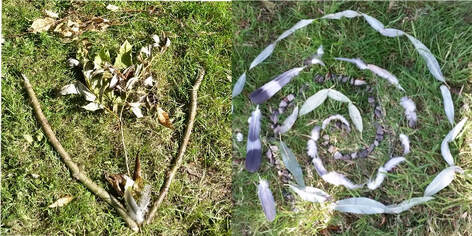|
I want to share with you some recent reflection from someone working in early years who recently did their level 3 leader training. The following helps to show the real benefits to being outside on a regular basis, engaging with nature and other children and being active for the whole day.
'During ‘lockdown’ I noticed that some children I know put on quite a significant amount of weight after spending most of their time indoors on digital devices. They were confined to the house and were only being allowed outside for an hour’s exercise each day; not being able to visit woodlands and parks had a big effect on them physically and mentally. Many years ago, when I first assisted at a preschool, if it was too cold or wet, the children would be encouraged to play inside, to keep warm (partly due to the staff not wanting to get cold or wet themselves). I observed the children becoming frustrated being cooped up inside, and also not fully engaging with all the indoor activities. When I became a manager of the preschool, I became aware of ‘Forest School’ and its principles and quickly realised that its ethos mirrored my own, confirming my beliefs that children benefit enormously from such activities. As we implemented many of these, the children became generally happier, more engaged, and there were fewer behavoural issues. Children developed a curiosity and fascination for the creatures they found under stones, logs and in the bug hotels they built. Their knowledge and understanding of the natural world increased significantly through these first-hand experiences which initiated a lot of questions by the children as their curiosity grew. This led them to develop a healthy respect for living creatures. They also learned to appreciate how the trees changed throughout the seasons, e.g. an apple tree from just leaves to blossom to fruit, then the leaves falling before growing once again in the springtime. As in the previous setting, the staff were reluctant to go outside when it was wet or cold, however the benefit to the children was apparent and the staff were quick to see the benefit of the increased learning opportunities. Some of the children in our Forest School had never experienced woodlands before, and were very excited to learn that they would be able to have fun exploring them for themselves. I observed that the childrens’ concentration had become much better, their listening skills improved and both fine motor and large motor skills were developing after using various tools and climbing trees and clambering over logs. Even though the children are very young, they were learning to keep themselves safe during activities and giving themselves a sense of pride in all that they did because they had done it themselves. One of the other things I love about Forest School is that it has no language barrier - even the children who don’t speak English and may struggle in the classroom, can join in all the activities with their peers and feel included in everything we do at Forest School.'
0 Comments
Your comment will be posted after it is approved.
Leave a Reply. |
Details
AuthorJon Attwood has been leading outdoor activities in the wider Bristol area for over 20 years. He developed a passion for nature and a love of the outdoors as a child and was lucky to have a free range childhood with plenty of time exploring wild corners of rural Essex. Jon is a Forest School leader and trainer and is happiest in the woods sharing experiences with children and adults. Archives
February 2024
Categories
All
|

 RSS Feed
RSS Feed
